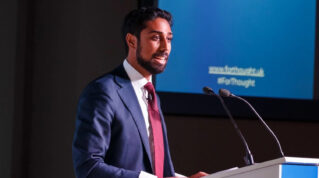Across the UK, communities are under strain. Whether it’s the rising cost of living, stretched public services, or deepening political divides, many people feel disconnected, disempowered, and negative about what’s to come. At its heart, this is a crisis of community and pessimism. In my research I’ve identified social connectedness, a sense of agency and access to resources as three protective factors that make communities thrive.
Without connection, agency and resources, people become vulnerable to those who promise simple answers to complex problems. The far right seeks to exploit these issues, but we can stop them by providing a hopeful alternative. Adult education has a role to play in tackling the polarisation we see in our communities.
The challenge
Change isn’t happening fast enough for people who are struggling. The far right is joining together issues like the cost of living, stretched NHS, deindustrialisation and the decline of the high street into a dangerous story of blame. They scapegoat marginalised groups like migrants and refugees, ethnic minorities and the LGBTQ+ community; they also attack the progressive causes (charities, law firms, journalists) who are trying to support these people or shine a light on the difficulties they experience.
At HOPE not hate, we work to challenge the far right and their narratives. But they are skilled communicators. They frame their messages emotionally, exploiting people’s desperation to create a sense of competition and scarcity: that there’s “not enough to go around”, and that some people are taking more than their “fair share”.
Social media amplifies this. Algorithms push sensationalist content and connect together different conspiracies and hateful rhetoric. We have seen how online discourse can spill over into offline violence: the riots following the tragic Southport attack in August last year, or recent events in Ballymena.
Adult learning as part of the solution
I believe adult education can be part of the solution because it is rooted in local communities and designed to build trust, openness and purpose.
The small, group-based learning that takes place through adult learning provider the WEA helps to foster belonging. Learners aren’t just learning new skills, they’re meeting people they might not otherwise cross paths with. In fact, 88 per cent of WEA learners say they met people they wouldn’t normally encounter during their learning. This builds empathy, reduces fear, and helps form the relationships that protect against polarisation.
The WEA has also developed tools to help people navigate today’s information landscape, like an open-access resource on combatting disinformation created with the journalist Amanda Ruggeri. It’s an excellent starting point for the kind of critical thinking that our new digital age demands.
Learning to tackle the far right goes beyond the academic. Publishing facts and ‘myth busting’ can dry up the conversation and escalate arguments about which sources of information are trustworthy or accurate. On the other hand, learning to be curious and ask people why they think what they think and asking open-hearted questions encourages people to understand their thought processes.
The WEA’s work is deeply local. 73 per cent of learners attend sessions in physical venues rather than online, the majority within a three-mile radius of their home. These are often the same venues that host other community services, meaning adult education becomes a gateway into broader civic life. It’s work in Leicester helped support community cohesion after the 2022 unrest.
Adult learning must be funded to succeed
Funding cuts to adult education limit its potential to address the challenges we face today. Investment in children’s education is essential, but often it is used as a long-term fix for problems that are happening right now. We cannot kick the can down the road. Community-based learning for all should have a seat at the table when it comes to broader conversations about cohesion, resilience, and inclusion.
We need government, policymakers and providers to:
- Invest in local, community-based learning.
- Fund social infrastructure. Shared spaces and opportunities for connection are vital for communities.
- Follow through on initiatives like the £1.5 billion neighbourhood plan, ensuring communities can shape their own futures through inclusive strategies.
Let’s be clear: people vulnerable to far-right narratives are not ‘hard to reach’. They’re online, in our workplaces, parents at the school gate. Adult education can and should be part of the national conversation on tackling extremism.















Your thoughts